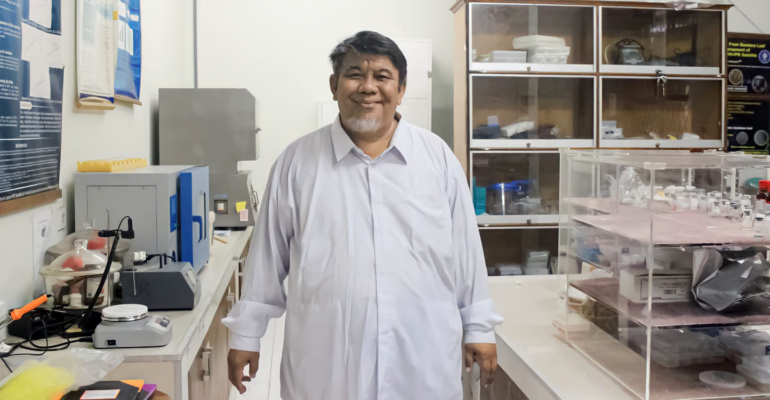Professor Irzaman Reveals Steps Towards Technological Independence in the Health Sector

In the pursuit of technological independence, particularly in the field of health, the role of ferroelectric material physics becomes crucial. This was disclosed by Professor Irzaman, Chair of the Department of Physics at the Faculty of Mathematics and Natural Sciences (FMIPA) at IPB University.
He explained that ferroelectric materials possess diverse properties that can be utilized for various purposes, such as temperature sensors, infrared sensors, and thermal infrared switches.
However, concrete steps are needed to achieve independence in the application of this technology. According to him, cross-sector collaboration is key to ensuring that ferroelectric technology can be applied to support the nation’s health independence.
“One of the first steps to achieve independence in ferroelectric technology is for the government or private sector to invest in research and development outcomes. This includes providing funds for scientists and engineers to conduct cutting-edge research in their field,” said Professor Irzaman during a virtual Press Conference for the Inaugural Scientific Oration of IPB University on February 22.
“In addition, it is important to build partnerships with academic institutions and industry leaders to promote collaboration and knowledge-sharing,” added the figure who is also a lecturer in the Department of Physics at FMIPA, IPB University.
As an example of successful collaboration, IPB University, the National Research and Innovation Agency (BRIN), and PT Tesena Inovindo, funded by the Ministry of Education, Culture, Research, and Technology (Kemendikbudristek) and the Education Fund Provider Agency (LPDP) of the Ministry of Finance of the Republic of Indonesia, conducted research on a Non-Invasive Blood Biomarker Measurement Device consortium.
“The hemoglobin level measuring device produced by the consortium has undergone diagnostic testing at Brawijaya University Hospital and has shown satisfactory accuracy, currently in the process of obtaining regulatory approval,” he added.
With concrete steps and cross-sector cooperation, Professor Irzaman emphasized that Ferroelectric Material Physics can support the nation’s independence in the health sector.
“Three important steps to realize the role of Ferroelectric Material Physics in supporting the nation’s health independence are: it must be done from now on, from oneself and consortiums, and from small competencies towards significant achievements,” explained the recipient of the Satyalancana Karya Satya award.
Professor Irzaman hopes that collaboration among academics, businesses, communities, and the government (ABCG) will continue to ensure that ferroelectric technology supports the nation’s health independence.
“Our hope for the future is that we remain strong. What is the use of researchers if not supported by partners such as BRIN and PT Tesena Inovindo; it’s like a valley of death. We always collaborate to form consortia so that this forward projection develops,” he said.
“We have successfully created light sensors, temperature sensors, pressure sensors; undoubtedly, they will compete with factory sensors. Further development should not be interrupted. If possible, we become a productive nation, not a consumptive one,” concluded Professor Irzaman. (MHT/Rz) (IAAS/RUM)



